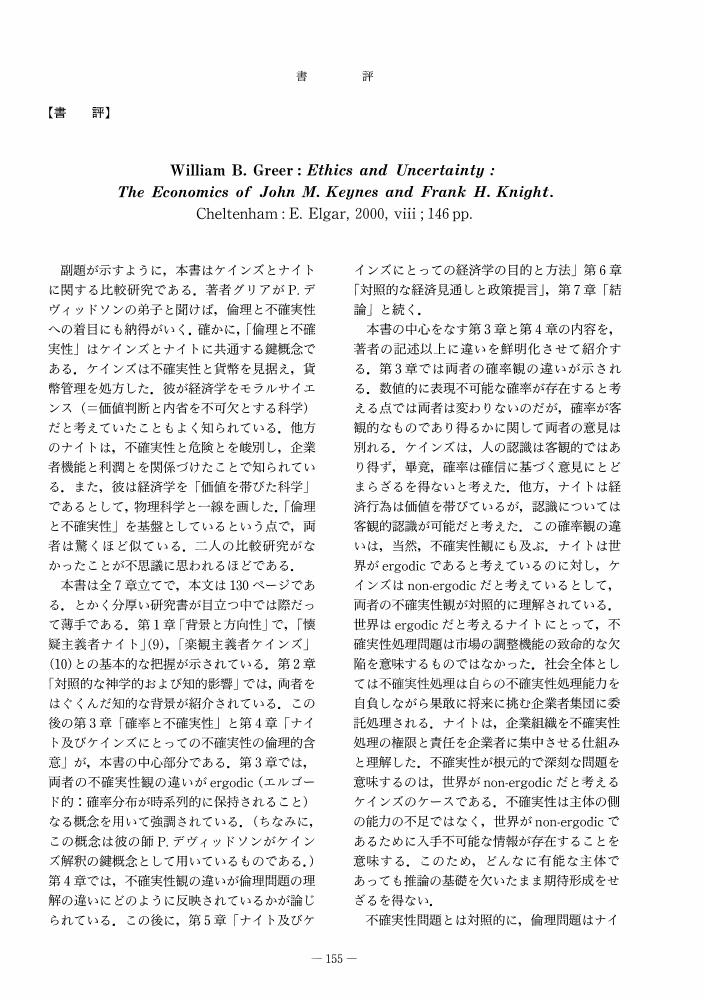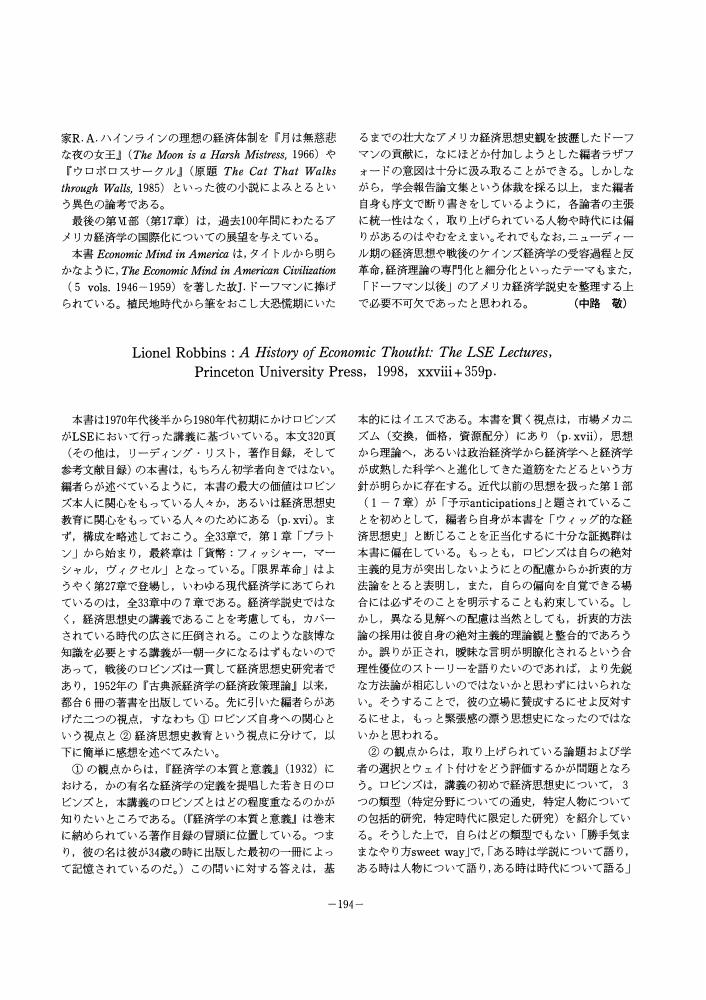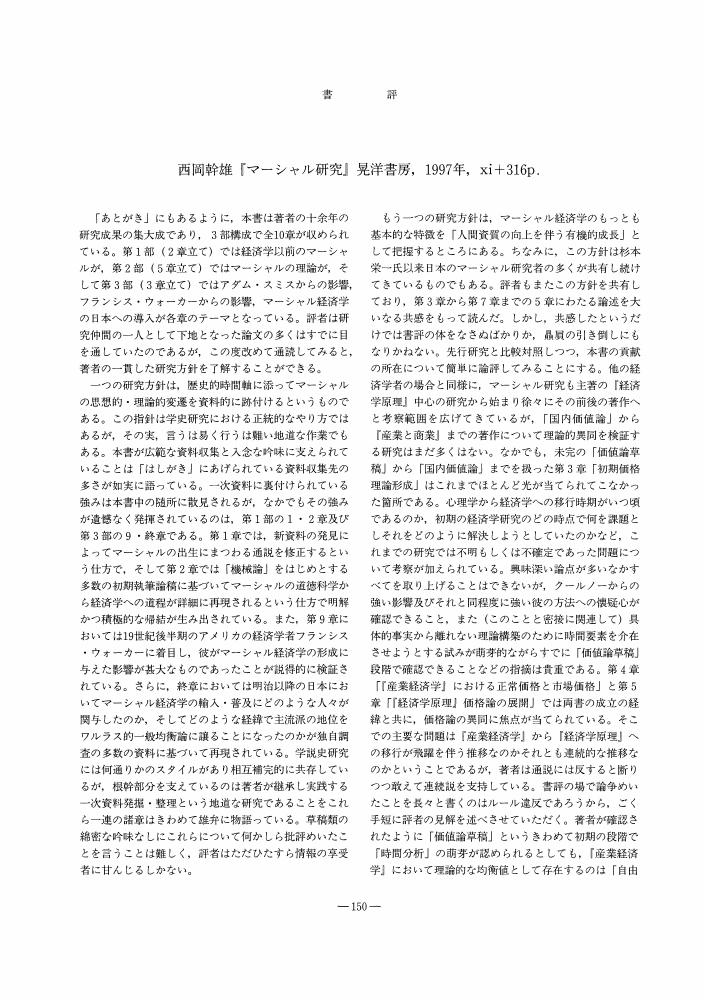3 0 0 0 OA F. ナイトにおける経済学の倫理性と科学性
- 著者
- 藤井 賢治
- 出版者
- The Japanese Society for the History of Economic Thought
- 雑誌
- 経済学史学会年報 (ISSN:04534786)
- 巻号頁・発行日
- vol.38, no.38, pp.134-145, 2000 (Released:2010-08-05)
- 参考文献数
- 35
The Chicago School has changed since Knight's time. Though the modern Chicago School puts an emphasis solely on the positivistic aspect of economics, Knight emphasizes the ethical aspect of economics at the same time. This change corresponds to that of liberalism in Chicago.Putting evaluation of these changes aside, we try to understand why and how Knight thought ethics and economics are inseparable. We find his basic vision of a society to be consisting of problem-solvers. For a person trying to find out what he or she really wants, freedom is needed, not to get the best, but to have a chance to try. Therefore economic activities consist of two interrelated parts: seeking better values and satisfying wants. Correspondingly two kinds of freedom must clearly be distinguished. One is freedom as an end in itself, and the other is freedom as an instrument. Of course, freedom as an end in itself can only be defended on ethical grounds.Similarly, scientific activities can be understood as consisting of two parts: seeking “better truth” and getting useful results. According to Knight, defining truth is also a matter of value judgment.Thus, economics is value-loaded in two meanings. One is that the behavior of seeking better values, i. e., freedom as an end in itself, is value-loaded. The other is that truth, which economics as one branch of science explores, is value-loaded.
2 0 0 0 OA 経済学の制度化とマーシャル評価
- 著者
- 藤井 賢治
- 出版者
- The Japanese Society for the History of Economic Thought
- 雑誌
- 経済学史学会年報 (ISSN:04534786)
- 巻号頁・発行日
- vol.33, no.33, pp.79-89, 1995 (Released:2010-08-05)
- 参考文献数
- 28
This paper examines how the economics of Marshall was pushed out of the mainstream of economics after his death.We firstly try to comfirm that the compatibility problem between competition and increasing returns was the main concern of Marshall from the early days of his career up to his Principles. Three new analytical tools he introduced into the Principles were intended to answer this problem. These are the distinction between internal and external economics, the period analysis, and the representative firm. The vision of the market as an organic system, we contend, is the key to understanding these three tools.Because economists at the early stage of institutionalization of the profession were eager to secure reliable analytical methods, the assessment of the economics of Marshall centered around the consistency of his analytical tools with the partial equilibrium method. Consequently, not enough attention was paid to the vision underlying his analytical tools. The same logic explains the gradual displacement of partial equilibrium method by general equilibrium method which started shortly after the assessment of Marshall by the Cambridge economists during the 1930s.
1 0 0 0 OA マーシャルの生産知識論
- 著者
- 藤井 賢治
- 出版者
- The Japanese Society for the History of Economic Thought
- 雑誌
- 経済学史学会年報 (ISSN:04534786)
- 巻号頁・発行日
- vol.43, no.43, pp.11-23, 2003 (Released:2010-08-05)
- 参考文献数
- 24
In this paper, we try to reinterpret Marshall's External Economies with the key con cept of “the knowledge on production methods.” In Section 2, through reexamining the criticism directed against Marshall's treatment of increasing returns, we outline the reason why we seek the possibility of “external economies at an industry level.” The consequence of the Cambridge Cost Controversy was quite legitimate as far as the adoption of the equilibrium method was premised. Marshall's representative firm cannot be supported when assessed strictly since it is a static concept that contains several dynamic forces in it. Surely, we need to adopt a dynamic method for dynamic phenomena, which Allen Young once maintained forcibly. But we differ from Young in that we consider a partial method to be useful in spite of the fact that he contended the analysis of increasing returns to be conducted in inter-industrial context.In Section 3, the function of the organization of a firm is discussed from the standpoint of “the knowledge on production methods, ” which is the type of applicable knowledge that cannot be discovered and learned from basic principles nor restored as explicit knowledge. The characteristic of the knowledge on production methods is that both improving and learning take place only gradually through a trial-and-error process. So, time and stable environments are necessary for this type of knowledge to be utilized effectively. We show that internal economies can be interpreted as the economies of specialization and integration of production knowledge at a firm level.In Section 4, we proceed to the reinterpretation of Marshall's external economies. What various firms in an industry face is the situation where the knowledge on the production methods is not in a complete form and is much diversified among them. Thus, an industry can be regarded as a place of competition over alternative production methods. Firms in an industry strive to improve their own knowledge while paying attention to the movements of other firms. Firms in the same industry can be viewed to comprise a kind of knowledge community where the knowledge on the production methods spreads and is shared. Although firms in the same industry are in a competitive relation, but are on the same vessel in another viewpoint. For, any progress in production methods carried out by one firm is a threat to others in the same industry in the short run, but contributes to the industry as a whole in the long run. The shared knowledge can contribute to unintended cooperation among firms that adopts the same production knowledge just as a commonly shared language does. Thus, standardization helps to economize coordination costs between firms in the same industry. The main contention of this paper is that Marshall's external economies can be reinterpreted as the economies available through the standardization of knowledge on production methods that takes place mainly at the industry level. Being reinterpreted in this way, Marshall's concept of external economies has a sufficient economic basis.
- 著者
- 藤井 賢治
- 出版者
- The Japanese Society for the History of Economic Thought
- 雑誌
- 経済学史学会年報 (ISSN:04534786)
- 巻号頁・発行日
- vol.42, no.42, pp.155-156, 2002 (Released:2010-08-05)
- 著者
- 藤井 賢治
- 出版者
- The Japanese Society for the History of Economic Thought
- 雑誌
- 経済学史学会年報 (ISSN:04534786)
- 巻号頁・発行日
- vol.37, no.37, pp.194-195, 1999 (Released:2010-08-05)
1 0 0 0 OA 西岡幹雄『マーシャル研究』晃洋書房, 1997年, xi+316p.
- 著者
- 藤井 賢治 西岡 幹雄
- 出版者
- 経済学史学会
- 雑誌
- 経済学史学会年報 (ISSN:04534786)
- 巻号頁・発行日
- vol.36, no.36, pp.150-152, 1998 (Released:2010-08-05)
- 著者
- 藤井 賢治
- 出版者
- The Japanese Society for the History of Economic Thought
- 雑誌
- 経済学史学会年報 (ISSN:04534786)
- 巻号頁・発行日
- vol.35, no.35, pp.177-178, 1997 (Released:2010-08-05)
1 0 0 0 OA マーシャル『産業と商業』の動態論
- 著者
- 藤井 賢治
- 出版者
- The Japanese Society for the History of Economic Thought
- 雑誌
- 経済学史学会年報 (ISSN:04534786)
- 巻号頁・発行日
- vol.34, no.34, pp.77-88, 1996 (Released:2010-08-05)
- 参考文献数
- 27
The economics of Marshall has long been assessed mainly on The Principles of Economics; besides, the assessment centered on the partial-equilibrium aspect of it. Although Marshall himself recommended and pursued a biological economics, his attempt has been evaluated as merely a promise. This paper examines Industry and Trade, which has practically been ignored as far as its theoretical aspect is concerned. One can find ‘standardization’ plays the key role in the historical accounts of that book. ‘Standardization’ which means more common knowledge possessed by members of an organization, is caused by habitual behaviours of agents or institutional arrangements agreed upon and promotes the development of that organization, thereby increasing the productivity of it. ‘Standardization’ captures an interaction of men and environments in an economic sense and provides Marshallian economics with the dynamics necessary for organizational growth.
1 0 0 0 OA 『一般理論』形成史研究の現在
- 著者
- 藤井 賢治
- 出版者
- The Japanese Society for the History of Economic Thought
- 雑誌
- 経済学史学会年報 (ISSN:04534786)
- 巻号頁・発行日
- vol.32, no.32, pp.121-126, 1994 (Released:2010-08-05)
- 参考文献数
- 27
1 0 0 0 OA マーシャルにおける組織と分配
- 著者
- 藤井 賢治
- 出版者
- The Japanese Society for the History of Economic Thought
- 雑誌
- 経済学史学会年報 (ISSN:04534786)
- 巻号頁・発行日
- vol.31, no.31, pp.58-66, 1993 (Released:2010-08-05)
- 参考文献数
- 12
The importance of Organization in Marshall's economics has gradually come to be recognized. This paper carries further this line of thought as to develop an implication for his theory of distribution.Factors of production employed within different organizations (firms or industries) can never be expected to earn the equal rates of reward in Marshall's system. Thus, the notion of ‘capital in general’ or that of ‘labor in general’ is without substance except in a special case. No normal rate of profit nor of wage is determined in a market, but is defined only in relation to the representative firm. The role of ‘free capital’ which had best be interpreted as capital outside an organization is to determine the rate of interest as a market price for using capital and to apply it to existing capital within different organizations to estimate the amount of net interest which must be paid out of whatever profits firms realized.There is no confusion between the rate of interest and the rate of profit as sometimes claimed. The real problem lies in the confusion between the money rate of interest and the real rate of interest arising from the ambiguous character of ‘free capital’.
- 著者
- 藤井 賢治
- 出版者
- The Japanese Society for the History of Economic Thought
- 雑誌
- 経済学史学会年報 (ISSN:04534786)
- 巻号頁・発行日
- vol.30, no.30, pp.103, 1992 (Released:2010-08-05)
- 著者
- 藤井 賢治
- 出版者
- The Japanese Society for the History of Economic Thought
- 雑誌
- 経済学史学会年報 (ISSN:04534786)
- 巻号頁・発行日
- vol.28, no.28, pp.43-44, 1990 (Released:2010-08-05)
1 0 0 0 OA ケンブリッジ、オクスフォード、LSEの経済思想と現代福祉国家の変容
19世紀末以降のケンブリッジ、オクスフォード、LSEの経済思想の展開を、現代福祉国家の変容・危機を視野に入れて、共同研究を進め成果を得た。具体的には、1. 「創設期の厚生経済学と福祉国家」から厚生経済学史の再検討へ、2. リベラリズムの変容と福祉国家-ニュー・リベラリズムからネオ・リベラリズムへ、3. マーシャル、ケインズと同時代の経済思想、4. ケインズと現在の世界経済危機-戦間期との比較考証、の4点を中心に国際共同研究を進め成果を得た。






